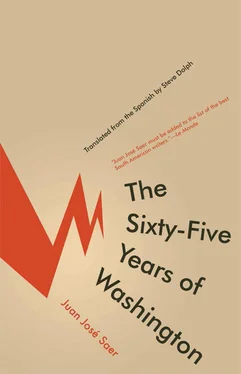Juan José Saer - The Sixty-Five Years of Washington
Здесь есть возможность читать онлайн «Juan José Saer - The Sixty-Five Years of Washington» весь текст электронной книги совершенно бесплатно (целиком полную версию без сокращений). В некоторых случаях можно слушать аудио, скачать через торрент в формате fb2 и присутствует краткое содержание. Год выпуска: 2010, Издательство: Open Letter, Жанр: Современная проза, на английском языке. Описание произведения, (предисловие) а так же отзывы посетителей доступны на портале библиотеки ЛибКат.
- Название:The Sixty-Five Years of Washington
- Автор:
- Издательство:Open Letter
- Жанр:
- Год:2010
- ISBN:нет данных
- Рейтинг книги:3 / 5. Голосов: 1
-
Избранное:Добавить в избранное
- Отзывы:
-
Ваша оценка:
- 60
- 1
- 2
- 3
- 4
- 5
The Sixty-Five Years of Washington: краткое содержание, описание и аннотация
Предлагаем к чтению аннотацию, описание, краткое содержание или предисловие (зависит от того, что написал сам автор книги «The Sixty-Five Years of Washington»). Если вы не нашли необходимую информацию о книге — напишите в комментариях, мы постараемся отыскать её.
The Sixty-Five Years of Washington — читать онлайн бесплатно полную книгу (весь текст) целиком
Ниже представлен текст книги, разбитый по страницам. Система сохранения места последней прочитанной страницы, позволяет с удобством читать онлайн бесплатно книгу «The Sixty-Five Years of Washington», без необходимости каждый раз заново искать на чём Вы остановились. Поставьте закладку, и сможете в любой момент перейти на страницу, на которой закончили чтение.
Интервал:
Закладка:
Juan José Saer
The Sixty-Five Years of Washington
To Michael, Patrick, Pierre Gilles, who practice three true sciences, grammar, homeopathy, and administration, the author dedicates, for the Sunday conversations, this comedy
but then time is your misfortune father said.
In another man devoured
my own death I don’t see
but plagued by geometric flowers
I waste away the hours
and now they keep vigil for me
The First Seven Blocks
Suppose it’s October, October or November, let’ssay, in 1960 or 1961, October, maybe the fourteenth or sixteenth, or the twenty-second or twenty-third maybe — the twenty-third of October in 1961 let’s say — what’s the difference.
Leto—Ángel Leto, no? — Leto, I was saying, has, a few seconds ago, stepped off the bus on the corner of the boulevard, far from the usual stop, compelled by the sudden desire to walk, to traverse San Martín, the central avenue, on foot, and to let himself get lost in the bright morning instead of shutting himself up in the dark mezzanine of one of the businesses where for the last few months he has patiently but impassively kept the books.
He has, then, stepped off, not without bumping into some passengers who were trying to get on and in his haste generating among them a momentary wave of vague protests; he has waited for the bus to pull away and move metallically down the boulevard toward the city center; he has crossed, alert, both sides of the boulevard separated by the center median, which is half planted and half paved, avoiding the cars driving, placid and hot, in both directions; he has reached the opposite sidewalk, has bought a pack of Particulares and a box of matches at the cigarette kiosk that he has put away in the pockets of his short-sleeved shirt, has walked the few meters to the corner, where he has just arrived, turning the corner south on the eastern sidewalk, the shady side at that hour; and he has begun to walk down San Martín, the central avenue — its parallel sidewalks, as they approach the city center, begin to fill with businesses selling records, shoes, groceries, fabric, candy, books, cigarettes, and also with banks, perfume shops, jewelry stores, churches, galleries, and which, at opposite ends, when the cluster of businesses thins out and finally disintegrates, reveal the pretentious and elegant façades, including some — why not — residential buildings, many of which are decorated, beside the front door, with the bronze plaques that publicize their occupants’ profession, doctors, lawyers, notaries, engineers, architects, otorhinolaryngologists, radiologists, dentists, accountants, biochemists, brokers — in a word, essentially, or in two better yet, to be more precise, every thing.
The man who gets up in the morning, who takes a shower, who eats breakfast and goes out, afterward, into the sun of the city center, comes, without a doubt, from beyond his bed, and from a deeper and heavier darkness than his bedroom: nothing and no one in the world could say why Leto, instead of going to work this morning, like every other day, is now walking easy and calm under the trees that amplify the shade from the row of houses, down San Martín to the south. He suffered so much , said his mother Isabel during breakfast before she left for work; alone afterward, Leto poured a second cup of coffee and went to drink it in the rear courtyard. This He suffered so much was stripped of its representations while he walked around the cramped and blooming courtyard where in the shady corners grass and shrubs, flowerpots and planters retained the dampness of the morning dew, but its overall shape and its impalpable reverberations still preserved their fragile and distracted resonance. Maybe the damp and concentrated shade that persisted at the foot of the houses, on the central avenue, or that mix of damp and brilliance the foliage displays in spring, and which stands out in some front yards, is what recalls his mother’s expression to Leto’s mind once again, how it doubles as sincere gesture and set phrase. The morning humidity that persists in the rising but mitigated heat is absorbed, by association, into the persistent and well-framed image, strange but at once familiar, of his mother who, turning from the gas stove, bringing the steaming coffee pot in her hand, uttered, in a low and thoughtful tone, as though to herself, without the slightest connection to what she had been saying just then, that sentence: He suffered so much . In the early penumbra of the kitchen, the little blue flames joined into concentric rings continued burning behind her after she removed the coffee, the milk, the water, the toast, and turned toward the table with the steaming coffee pot. To Leto, the sentence that was just uttered and has dissipated in the kitchen has the characteristic ambiguity of many of his mother’s assertions — he finds it difficult to understand its precise meaning; and when he raises his head, stifling his embarrassment and maybe even his shame, and begins to scrutinize Isabel’s expression, his suspicions that this ambiguity is deliberate only increase, now that, against the backlight of the little blue flames, Isabel’s now slightly thickened figure advances in silence, her eyes lowered, avoiding his gaze, disarming any inquiry. She has let her comment slip unexpectedly, during the routine exchange over breakfast in the kitchen, when phrases, spoken politely, out of courtesy, a dubious motive, have no more significance or extension than the sound of silverware striking plates. And Leto has begun to think, while he takes the first sip of black coffee and watches her sit, abstractedly, on the other side of the table: It must be the hope of erasing her humiliation that makes her pretend he suffered so much —but, and Leto raises his head again and fixes his eyes on the dumpy though still somewhat childlike face, which, with its eyelids lowered, reveals nothing: Can she tell? Does she notice? Is she sounding me out? Is she testing me? The hardest part, regardless, is, at a distance, knowing how to reply. Leto would have been well-disposed and, above all, relieved, to give the response she is waiting for, if, just then, it were possible to know what she is waiting for, but, with a desperate insistence, she seemed to want him to guess it on his own, and does not give him, therefore, any help. Leto searches, hesitates, and then, unsure, though not without a degree of resentment, the way he reacts toward every comment of that kind, does not say anything. A somewhat hard silence follows, uncomfortable for them both, in which there is possibly deception and not even a little relief, and which Isabel breaks by emptying her cup of café con leche in one swallow and chewing, noisily, her last piece of toast, and afterward recur the opaque and customary comments furnished with ambiguity by their intonation alone, though issued from neutral and distracted lips. These comments also come, certainly, from farther away, farther back than the tongue, the vocal chords, the lungs, brain, and breath, from the far side of the depository of named and accumulated experience, from which, blindly groping, though believing to consider carefully, each person withdraws and expels them. In the silence that follows, including when, after brushing his cheek with her lips, closing behind her, softly, two or three doors, she has finally gone, before him, to work, her image, as strange as it is familiar, begins to unglue itself from its representations so as to disseminate itself more easily throughout his body, as though, in its ebb and flow, blood is able to reduce the impalpable to its material tenacity, metabolizing and distributing it to cells, tissue, flesh, bones, muscles. With his second cup of coffee in hand, while he observes the dampness of the morning dew that’s yet to dissolve from the corners of the shade, Leto, though not his body, has now forgotten his mother, and it is this same humid shade persisting now, around ten, on the central avenue, which covers his body like the first invisible layer of the world and is likewise covered by the bright morning, that causes him again to remember her, to project her onto the unstable and inconstant little screen of images where he flashes, momentarily, the tiny spotlight of his attention. Without, as they say, a doubt, the same impulse that moved Isabel to utter her startling and mysterious comment, has caused him, suddenly, to get off the bus, cross the boulevard, buy the cigarettes, and begin walking, for no reason, to the south.
Читать дальшеИнтервал:
Закладка:
Похожие книги на «The Sixty-Five Years of Washington»
Представляем Вашему вниманию похожие книги на «The Sixty-Five Years of Washington» списком для выбора. Мы отобрали схожую по названию и смыслу литературу в надежде предоставить читателям больше вариантов отыскать новые, интересные, ещё непрочитанные произведения.
Обсуждение, отзывы о книге «The Sixty-Five Years of Washington» и просто собственные мнения читателей. Оставьте ваши комментарии, напишите, что Вы думаете о произведении, его смысле или главных героях. Укажите что конкретно понравилось, а что нет, и почему Вы так считаете.












